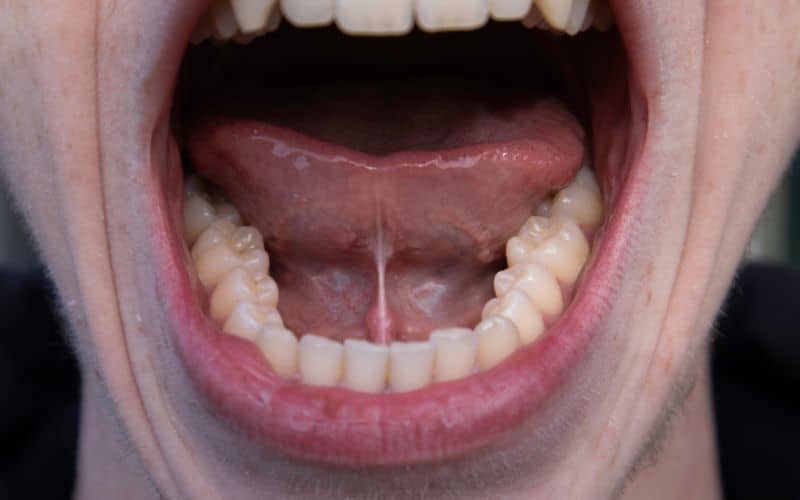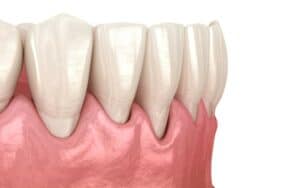Ankyloglossia, commonly known as tongue tie, is a condition that affects nearly 5% of newborns. Tongue tie occurs when the thin piece of skin beneath the tongue, called the lingual frenulum, restricts the tongue’s range of motion. This condition can have varying degrees of severity and can lead to a range of other related concerns.
What Is Tongue Tie?
Tongue tie is a congenital condition. If the lingual frenulum is shorter and thicker than usual, it can affect the normal movement of the tongue. In newborns, it can make breastfeeding more difficult, as the restricted tongue makes it harder to latch properly. As time goes by, it may also lead to speech difficulties, oral hygiene challenges, obstructive sleep apnea, and other concerns.
While some babies are born with a visible restriction, others may not display obvious signs. A healthcare professional, such as your dentist, can assess and diagnose the condition.

How Severe Can It Be?
There are varying degrees of severity, categorized into different levels from mild to severe. In mild cases, the lingual frenulum may restrict movement, but the impact on daily activities is minimal. As the severity increases, the limitations become more pronounced, affecting not only the range of motion but also the ability to perform essential functions like breastfeeding, swallowing, and even articulating certain sounds during speech.
The position of a tongue tie significantly influences its severity and impact. The closer the tie is to the tip of the tongue, the more it restricts the tongue. Anterior tongue ties are closer to the tip, and often affect breastfeeding and speech. Posterior tongue ties occur further back, and may impact oral hygiene and speech. Submucosal ties are hidden beneath the mucous membrane; the effects are usually minimal.
Issues Caused by Tongue Tie
Tongue tie can cause a range of concerns.
Breastfeeding Challenges
An early indicator of tongue tie is difficulty breastfeeding. The limited mobility of the tongue weakens the latch, making it challenging for the baby to effectively feed.
Speech Development
As a child grows, the impact on speech may become noticeable. The proper articulation of certain consonant sounds, such as “t,” “d,” “l,” and “r,” may be challenging for individuals with untreated tongue tie.
Dental and Oral Health
Tongue tie can make it difficult to brush and floss certain areas of the mouth, increasing the risk of tooth decay and gum disease. Additionally, the positioning of the tongue can affect teeth alignment and the development of the palate.
The Tongue Tie Surgery Procedure
Tongue tie treatment, known as frenotomy, is a swift procedure where the lingual frenulum is cut with scissors or a laser. It requires minimal incision to improve tongue mobility. General anesthesia isn’t commonly necessary. Infants may receive a topical numbing agent, while older individuals often get local anesthesia, with possible general anesthesia for severe cases.
When Should a Tongue Tie Surgery Be Completed?
While a frenotomy can be performed at any age, having it completed in infancy is recommended, especially if the condition is causing breastfeeding challenges. Early intervention can address feeding difficulties and potentially prevent associated issues. The procedure is minimally invasive, and babies recover quickly.

Addressing tongue tie in early childhood can help prevent or minimize speech difficulties and oral hygiene challenges. However, individuals who reach adulthood without having the surgery can still benefit from the procedure to improve speech, oral health, and overall quality of life.
Tongue Tie Myths
There are some common myths that cause some people to mistakenly believe they or their children don’t have ankyloglossia or don’t need treatment. The best way to be sure whether you or your child could benefit from a frenectomy is to consult with your dentist or physician.
Myth: All Tongue Ties Look the Same
The position, thickness, and tightness of the frenulum varies greatly. Some are easily visible, while others may be harder to detect. The severity also varies, affecting the symptoms and required treatment.
Myth: Tongue Tie Resolves on Its Own
While some cases of mild tongue tie may not cause significant issues and may improve with time as the child grows or with special exercises and stretches, more severe cases often require intervention. Waiting may mean unnecessarily dealing with the issues of ankyloglossia for longer and having the surgery later when it may be more uncomfortable and require a longer healing period.
Myth: Tongue Tie Only Affects Infants
While tongue tie is often identified and addressed in infancy, it can persist into childhood and adulthood. Different symptoms become noticeable as individuals face new challenges, including speech development and oral hygiene.
Myth: If a Child Can Stick Their Tongue Out, It’s Not an Issue
The ability to stick the tongue out is only one element of tongue mobility. Tongue restrictions can affect other movements, such as lateral or upward movement.
If you have questions about ankyloglossia, the friendly Hamilton Mountain Dental team can answer them and provide advice. Our dentist can diagnose and assess this condition, and make recommendations for treatment.




